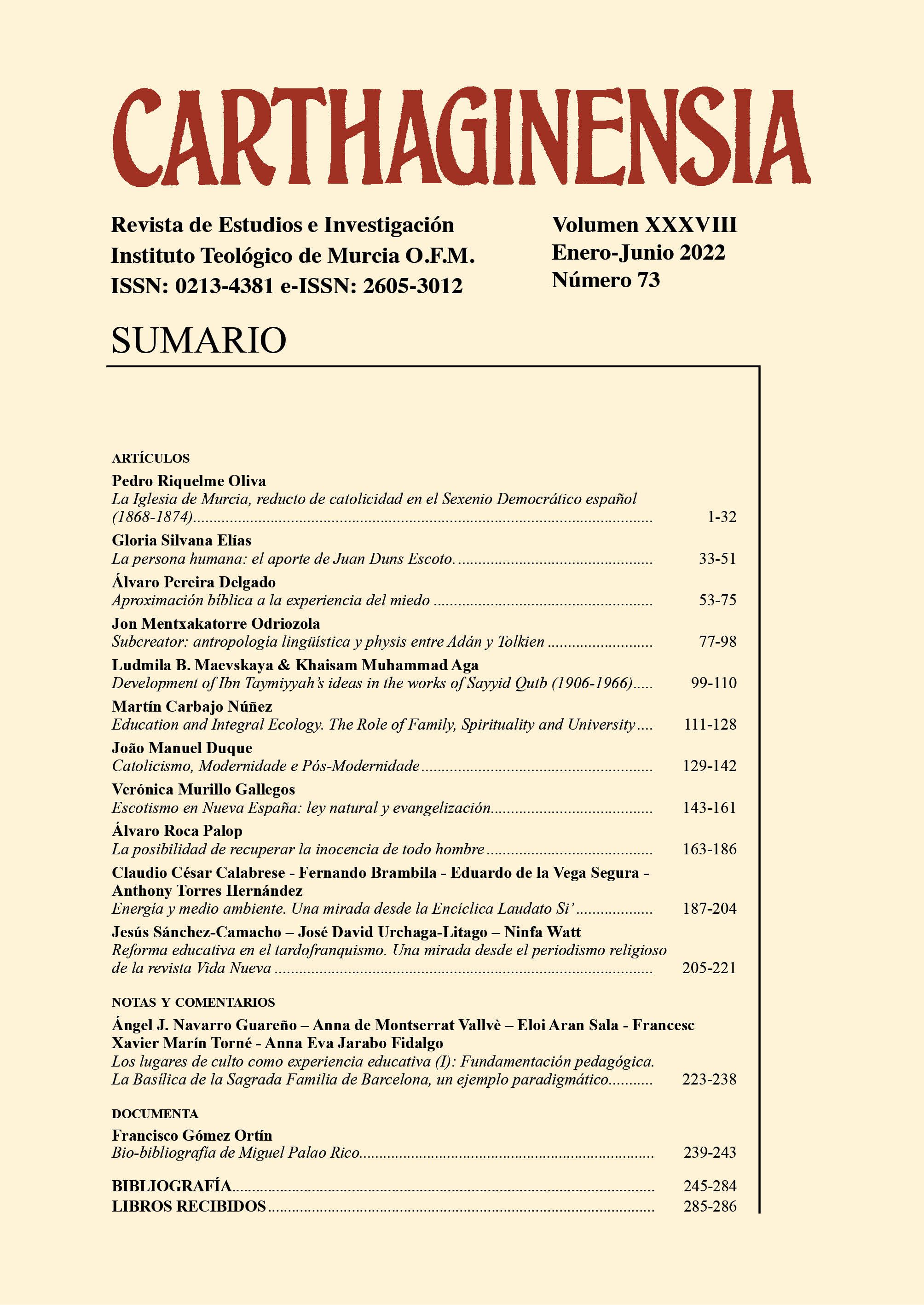Energy and environment. A look at the Encyclical Laudato Si'
Main Article Content
Abstract
Our work raises the aspects that we consider to be central to the Encyclical, especially the unity between economy-society-ecology, taking as a central idea the notion of "ecological conversion" and, from this, the limits of growth of a civilization fundamentally based on oil. This is because consumption levels will quickly meet the barrier of nature itself, since humanity will have consumed most of the fossil fuels by the end of the 21st century. It is, in short, the exhaustion of an ideal of science and progress that has failed to keep the promises of the enlightened model in which it was born. In this context, we present the ecological catastrophes caused by oil spills in the last decade and the positive and negative aspects of the latest oil extraction procedures; Despite these efforts and the integration of renewable energies, ecology in a Christian key requires an interior renewal that leads to a fuller awareness of man as a collaborator and custodian of creation.
Downloads
Publication Facts
Reviewer profiles N/A
Author statements
- Academic society
- Instituto Teológico de Murcia OFM
- Publisher
- Instituto Teológico de Murcia OFM
Global Statistics ℹ️
|
884
Views
|
202
Downloads
|
|
1086
Total
|
|
Article Details

This work is licensed under a Creative Commons Attribution 3.0 Unported License.
The works published in this journal are subject to the following terms:
1. Carthaginensia retains the patrimonial rights (copyright) of the published works, and favors and allows the reuse of the same under the license of use indicated in the following point.
2. The works are published in the electronic edition of the journal under a Creative Commons By (CC By) License https://creativecommons.org/licenses/by/3.0/es/. They may be copied, used, disseminated, transmitted and publicly exhibited, provided that: i) the authorship and the original source of publication (journal, publisher and URL of the work) are cited; ii) they are not used for commercial purposes; iii) the existence and specifications of this license of use are mentioned.
References
Auer, Alfons. 1984. Umweltethik: ein theologischer Beitrag zur ökologischen Diskussion, Düsseldorf: Patmos-Verlag.
Biervliet, John Harold. 2012. “La ecología humana. Complejidad del espacio y del tiempo”, Ciencias Sociales y Educación, Vol. 1/1: 147-162.
Bonell Rosabal, Sheyla. 2009. “Petróleo y biotecnología: análisis del estado del arte y tendencias”, Acimed (On line) v.19 n.1.
Buell, Frederick. 2014. “A Short History of Oil Cultures: or The Marriage of Catastrophe and Exuberance”. Journal of American Studies, 46/2: 273-293. DOI: https://doi.org/10.1017/S0021875812000102
Chirico, Adriana. 2014. Profili giuridici della comunicazione nella Chiesa. Bari: Cacucci Editori.
Costa, Giacomo - Foglizzo, Paolo. 2015. “Editoriale. L’ecologia integrale”, Aggiornamenti Sociali, agosto-settembre. Available in
https://www.arpae.it/cms3/documenti/_cerca_doc/ecoscienza/ecoscienza2015_4/Enciclica_ES4_15.pdf
Czarnecka, Magdalena. 2013. “Metafizyka w ekologii? Ekosystem jako Z?o?ony System Adaptacyjny”. Scientia et Fides, 1/1: 183-195. DOI: https://doi.org/10.12775/SetF.2013.006
De Gregorio, Laura. 2016. “Laudato Sì: per un’ecologia autenticamente cristiana”. Stato, Chiese e pluralismo confessionale, n° 41, available in www.staroechiese.it .
Dedov, A. G.- Ivanova, E. A.- Sanszhieva, D. A. et al. (2017). “New materials and ecology: Biocomposites for aquatic remediation”, Theoretical Foundations of Chemical Engineering, 51/4: 617-630. DOI: https://doi.org/10.1134/S0040579517040042
Enrique Alarcón recognovit et instruxit. 2020. Sancte Thomae de Aquino, Summa Theologiae, in Opera Omnia https://www.corpusthomisticum.org/ .
Enrique Alarcón recognovit et instruxit. 2020. Sancte Thomae de Aquino, Scriptum super Sententiis, in Opera Omnia https://www.corpusthomisticum.org/ .
Gil Fernández, Juan,trans. 1985. Las pasiones del alma de Descartes, Barcelona: Orbis.
Guo, Q. L.- Boufadel, M. C., et al. 2014. “A field experiment and numerical modeling of a tracer at a gravel beach in Prince William Sound, Alaska. Hydrogeol 22: 1795-1805. DOI: https://doi.org/10.1007/s10040-014-1184-3
Hallett, S. & Wright, J. (2011). Life without oil: why we must shift to a new energy future, Amherst, N.Y.: Prometheus Books.
Informe Banco Mundial. 2018. La pobreza y la prosperidad compartida 2018: Armando el rompecabezas de la pobreza, panorama general del informe, Banco Mundial, Washington, DC. Available in
https://openknowledge.worldbank.org/bitstream/handle/10986/30418/211330ovSP.pdf.
Kuhn, Thomas. 20042. La estructura de las revoluciones científicas. México: FCE.
Lledó Iñigo, Emilio, trans. 1985. Ética Nicomáquea de Aristóteles, Madrid: Gredos.
Megías Quirós, José Justo. 2014. “El dominio de la Naturaleza: de la moderación escolástica al relativismo kantiano”. Persona y Derecho. Vol. 70/1: 147-169. DOI: https://doi.org/10.15581/011.70.147-169
Polo, Leonardo. 2008. El hombre y la historia, Pamplona: Cuadernos de Anuario Filosófico.
Polo, Leonardo.1991. Quién es el hombre. Un espíritu en el mundo. Madrid: Rialp.
Pontificio Consejo “Justicia y Paz”. 2004. Compendio de la Doctrina Social de la Iglesia, Libreria Editrice Vaticana, n. 166. Available in www.vatican.va.
Portoghesi, Paolo. 2014. Il sorriso di tenerezza. Letture sulla custodia del creato. Città del Vaticano: Libreria Editrice Vaticana.
Puig, Jordi. 2019. “Sensibilidad por el medio ambiente y cristianismo”. Scientia et Fides. 7/1: 73-96. DOI: https://doi.org/10.12775/SetF.2019.004
Rehman, Muhammad Moshin. 2012. “Enhanced Oil Recovery Using Electrical Methods”, ProQuest Dissertations and Theses; Thesis (M.S.) The Petroleum Institute (United Arab Emirates); Publication Number: AAT 1535245.
Revol, Fabien. 2015. Pour une écologie de l’espérance. Les chrétiens et la création. Lyon : Éditions Peuple Libre.
Revol, Fabien. 2018. “L’écologie intégrale comme capacité à aimer”, Lumen vitae. XXIII/ 4: 411-424.
S.S. Francisco, Exhortación apostólica Evangelii gaudium, available in http://www.vatican.va/content/francesco/es/apost_exhortations/documents/papa-francesco_esortazione-ap_20131124_evangelii-gaudium.html.
S.S. Francisco. 2015. Carta Encíclica Laudato Sì. Sobre el cuidado de la casa común, México: Ediciones Paulinas.
Scheid, D.P. 2016. The Cosmic Common Good. Religious Grounds for Ecological Ethics. New York: Oxford University Press. DOI: https://doi.org/10.1093/acprof:oso/9780199359431.001.0001
Scola, A. (2015), Abitare il mondo. La relazione tra l’uomo e il creato, Bologna: EMI.
Sellés, J. F. (1999). La virtud de la prudencia según Tomás de Aquino, Pamplona: Cuadernos de Anuario Filosófico (n° 90).
Zampetti, P. L. (1993). “Sovranità degli Stati e problema delle fonti di energia” in Lippolis, L. (a cura di), Diritti umani, poteri degli stati e tutela dell’ambiente. Milano: Giuffré.
Zyrin, V. - Ilinova, A.; “Ecology safety technologies of unconventional oil reserves recovery for sustainable oil and gas industry development”, Journal of Ecological Engineering, Volume 17, Issue 4, Sept. 2016, pages 35–40. DOI: https://doi.org/10.12911/22998993/64637






